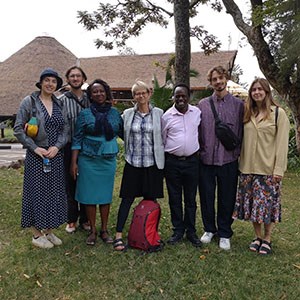One of the initiators of the idea to organise the IFLA congress simultaneously in Kenya and Sweden was Emily Wade, professor at the Department of landscape architecture, planning and Management at the Swedish University of Agricultural Sciences (SLU).
Need for better representation
"We saw an unequal representation of Landscape Architects from all parts of the world. The African continent has often been poorly represented for different reasons: there are not as many Landscape Architects there, they have not had the same opportunities to travel and there can be political limitations in the VISA process. We wanted to involve Landscape Architects from countries in the African continent and make it possible for them to take part in the congress," says Emily Wade.
"Beautiful dynamic and broad range of topics"
"It was nice to see how the theme Emergent Interaction inspired us to collaborate and co-arrange an event with partners from the northern and southern hemisphere," she says.
Topics such as circular landscape architecture and sustainability were highlighted in a northern European context, as well as pressing topics in the Kenyan context like including ancestral intelligence, waste management and food security.
"There was a beautiful dynamic and broad range of topics showing the role of landscape architects and what they might contribute to in the future," says Emily Wade.
Master course for students in Malmö and Nairobi
In connection to the IFLA World Congress, the master course, Act Local, Think Global, was organised by SLU Landscape and the Department of Landscape Architecture, Planning and Management. The course targeted Landscape architect students from SLU and Jomo Kenyatta University of Agriculture and Technology (JKUAT) in Nairobi.
With financial contribution from SLU Global parts of the Swedish course organising team and four SLU students had the opportunity to attend the IFLA conference in Nairobi.
Blue-green water solutions
"In the course, we chose to focus on green water problems and solutions in different locations and contexts”, says Maria Kylin, a senior lecturer in Landscape planning at the Department of Landscape Architecture, Planning and Management at SLU, who was part of the organising course team and led the scientific committee of the congress.
The SLU students collaborated with students at JKUAT and developed design entries for a student design competition at the IFLA congress. They also developed future scenarios for Nyhamnen in Malmö and Nairobi Dam for an exhibition at Form/Design Centre in Malmö.
Design for water treatment and food security
One of the students who took part in the course was Landscape Architecture student Aleksandra Arent. She collaborated with Kenyan students on a design proposal for water treatment and food security in the Kibera informal settlement in Nairobi. She appreciated working with three students from Nairobi and found it interesting to see how they could exchange their knowledge and approaches.
"A huge eye-opener"
"It was a huge eye-opener for me. I realised that we cannot tackle sustainability issues and the climate crisis without also dealing with social inequality, which was extremely visible in both Nairobi and in the presentations at the congress," says Alexandra Arent.
"My thinking shifted, from thinking very locally about issues with a focus on Western and Central Europe to thinking more on a global scale. The project emphasised to me that the green transition in Europe cannot be just without minimising the present exploitation of the Global South by the Global North," she argues.
Inspired to write a master thesis
Inspired by the impressions from the tour to Nairobi, Aleksandra Arents now plans to write her master thesis on the topic. She would like to increase her understanding of Landscape Architecture in relation to other fields such as politics and economy.
"Post-colonial social inequality affects urbanisation and the informal settlements are growing every day. As Landscape Architects, we can tackle the symptoms, but the underlying problems will keep going," she reflects.
Lecturer Maria Kylin hopes to continue with the collaboration between SLU and JKUAT and is now working towards getting a renewed collaboration agreement between the two universities. The plan is to continue with collaborations within the Landscape Architecture programmes connected to sustainable development, urban planning and the built environment.
"International collaborations are an important way to start questioning preconceived notions and broaden our understanding of concepts such as sustainability and landscape," says Maria Kylin.
The IFLA World Congress is an annual congress organised by the International Federation of Landscape Architects. IFLA 2023 took place on 28-30 September 2023 in Stockholm, Sweden and Nairobi, Kenya. In 2024 the IFLA congress will be organised in Istanbul on 4-6 September.
Text: Teresia Borgman





